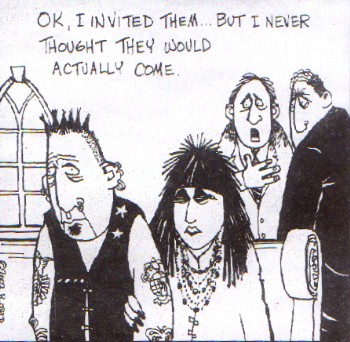imagine you've traveled back in time and you're face to face with a medieval Christian serf. you're able to communicate with him through some form or another (hey, worked in
Timeline, it can work in your imagination too!). after the usual chit chat about the weather you ask him about his goals in life. how was he bettering his lot in life? what impact was he making on his children? what type of world did he want to leave for his kids?
all of these questions would be met with a blank face.
the Christian view of history which dominated Europe at this time percieved life as just preparation for the next. The greek concept of Cycles were abandoned but one aspect was retained, mainly that history is a decaying process. History has a distinct beginning, middle and end. Creation, redemption, and last judgment. many still have this view.
this is the Pauline, Augustinian view of the world. It also embraces the idea of Entropy. there is no room for the individual, just duties and obligations, not freedoms and rights, that defined life in the larger community.
in 1750, Jacque Turgot walked into his class room in Sorbonne. He rejected both the cycles of the Greeks and the concept of continued degradation of Christianity. He argued that history proceeds in a straight line and that each succeeding stage of history represents an advance over the preceding one. this is our prevailing view, largely, of history. and in the Enlightenment, we have the advance of the individual over and against the group as the sole unit of society.
but now we have a problem. our mindset is that the world is getting better and yet our theology and even some of our science is medieval. Just think of Genesis and biology and physcis for a second. our theology states that the world has fallen and will only get worse until Christ comes again. Biology states that every living thing will one day die and Physics that order breaks down into chaos. these are vast oversimplifications but you get the gist.
so what if our theology and science were brought up to meet our mindset? is it possible?
i think it is. what if Genesis was viewed as more of a 'maturing' like i've discussed in the past in a few posts like
this one and
this one too. So we can affirm Turgot but note that he didn't have it all right either... he didn't deal with entropy. So while the individual dies, the group lives on. and maybe the group will one day desolve into nothing as well, but maybe not.
i'm now suggesting that despite entropy and the fact that every one has a 100% mortality rate, maybe there is one thing in the universe that doesn't exhibit entropy, namely life. i wrote about this idea in
this post from October.
why am i thinking all of this?
well i was discussing on another blog with my new friend Sabio, when it hit me. we as humans aren't really harnassing the power of mythos. the Modernist mindset is througly set on factual truth and operates on the assumption that "knowledge is certain, objective and good," followed by the belief that knowledge is "accessible to the human mind." Because knowledge is assumed to be good, rational, objective, and dispassionate, science is viewed as the savior that will rescue humanity from the ills of society as well as its vulnerability to nature. The future is, therefore, viewed as optimistic, things getting better thanks to our buddy Turgot. The Modern mind considered as suspect views that would "curtail autonomy" and individual freedom and those that seem to be based on some external authority other than reason and scientific [factual] experience.
But as science failed to cure all the ills of society and to free us of our vulnerability to nature and as societies the world over did not get better and better, empirical thought and individual autonomy began to slip as the formula for fulfillment. And by the 1970's, certainly—though the seeds of deconstruction were sprouting long before what was to be labeled "postmodern" would begin to disassemble the formula approach—a new view would begin to emerge.
In real life experience Modern individualism, autonomy and personal freedom had too often produced isolation, loneliness, estrangement, and the disintegration of community. we need a new model. one that harnesses the power of myth, community, and yet avoids the static labels and need for control that Modernists have yet doesn't fall into the superstitious rituals of our pre-modern Medieval peasant fore-bears. we still look for the gifts of the individual but in terms of the larger community. the individual is still the sole unit of society yet is placed in context and the connections are viewed as vital, not holding back or curtailing autonomy.
we become a people of covenant and autonomy.
what would that community look like?
is it possible?




